Koç School
The Koç School (Turkish: Koç Okulu) is a private coeducational school in Turkey founded by Vehbi Koç, one of Turkey's wealthiest businessmen. The school comprises a high school that pioneered the IB program in Turkey and an elementary school. Prospective students gain admission into the high school based on their achievements on the nationwide examination for high schools in Turkey.
| Koç School Koç Okulu | |
|---|---|
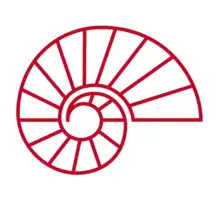 | |
| Location | |
| Information | |
| Type | Private, Boarding, Bilingual |
| Motto | Reason, Conscience & Courage |
| Established | 1988 |
| Founder | Vehbi Koç |
| CEEB code | 696175 |
| Chairperson | İpek Kıraç |
| Headmaster | Murat Günel |
| Enrollment | 2227 192 Boarding |
| Campus | Suburban (151 acres / 61 ha) |
| Color(s) | |
| Team name | Rams |
| Accreditations | IB, ECIS, NACAC |
| Newspaper | TAWA |
| Affiliation | Vehbi Koç Foundation |
| Website | www |
General information
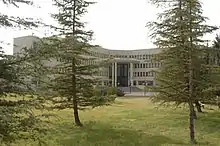
Koç School is a high and elementary school fully accredited by the Turkish Ministry of Education, European Council of International Schools (ECIS), International Baccalaureate Organisation (IBO), Independent schools UK, England, Scotland, Wales & NI and international schools worldwide (ISBI) and the National Association for College Admission Counseling (NACAC). It offers boarding for five or seven days a week for students of classes between high school prep to 12th grade at its dorms on its campus.
History
Founded in 1988 by Vehbi Koç Foundation, Koç School has quickly become one of Turkey's most selective and competitive university preparatory schools.
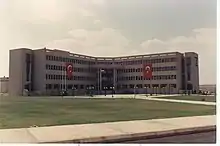
Koç School started offering the IB Diploma Programme in 1994.[1] With the introduction of the programme, many students began to apply to overseas educational institutes with high reputation.[2] Koç students have been accepted into universities such as Dartmouth, Princeton, Harvard, Oxford, Cambridge, Cornell, Yale, Georgetown, Columbia, University of Pennsylvania, Stanford, MIT, and University of Chicago.[3][4][5] With a guidance office committed to assisting students in gaining admission to colleges abroad, the number of Koç students seeking overseas education has constantly increased.
The school's Turkish university entrance success is also considerable:[6] general student achievement is among the top when compared with other similar high schools.[7] In fact in 2000, the top scorer of ÖSS was a Koç School graduate.[8] In the 2006 ÖSS, 19 Koç students were in the top 1000 of over 1.500.000 attendants and many students that applied abroad were accepted to top ten universities in the US.[9]
- General Directors
- John Chalfant (1988–1992)
- Gerald Shields (1992–1996)
- John Chandler (1996–2005)
- Tony Paulus (2005–2008)
- Robert Lennox (2008–2013)[10]
- Koray Özsaraç (2013–2018)
- Murat Günel (2018–present)[11]
- High School Directors
- Atakan Demirseren (1988–1998)
- Fehmi Özbay (1998–1999)
- Lalegül ... (1999–2000)
- Füsun Ersoy (2000–2006)
- İlkin Özyurt (2006–2008)
- Koray Özsaraç (2008–2013)[12]
- Selen Aydınoğlu (2013–2019)
- Elif Kara Özturk (2019–present)
Primary School Directors
- Mesrure Tekay (1998–2013)
- Handan Sungur (2013–2019)
- Demet Gören Niron (2019–present)
Middle School Directors
- Tümay Dovan (2013–2019)
- Meltem Önal Sertkaya (2019–present)
Campus and facilities
Koç School is located on a 151-acre (0.61 km2) campus on the eastern outskirts of Istanbul, near Tuzla, Istanbul. Many of the school facilities were subject to renovations after the first ten years of the school due to increased demands and population of the school.
The important facilities and buildings on the school campus are:
|
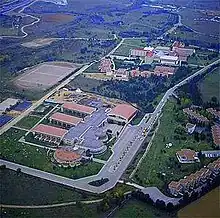 The Campus
|
High school
Academics
Koç School is a bilingual school in Turkish and English but also offers the option of a second language: French, German or Spanish. Students choose between an IB track or a non-IB track at the end of tenth grade. Koç School is also the IB coordinator in Istanbul, and prepared the IB Turkish Social Studies Curriculum to be covered in all around the world in IB Schools.[1]
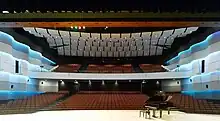

Each year, many Koç students prefer to continue their education at overseas universities. The school's Overseas College Guidance Office is strong with its admission statistics.[13] At the end of the academic year, each department gives awards to a select number of students with high academic standing after taking into account the feedback submitted by teachers.
Koç School is also successful in national[14] and international[15] high school competitions in mathematics and sciences.
The school also provides an international faculty with teachers from Australia, Britain, Brazil, Canada, India, Ireland, Russia, Scotland, The Netherlands, U.S., New Zealand and Turkey teaching Science, languages, arts. Some of the current and former notable faculty include John Freely,[16] writer and professor of physics at Boğaziçi University, and Erol Köroğlu, writer and doctor of literature and cultural studies at Sabancı University.
Curriculum
In the first two years of education, a high school student usually takes the following courses: Turkish Literature, Philosophy, Psychology, English, Physics, Chemistry, Biology, Arts, Military Science, Physical Education, Religion and Ethics, History, Health, Geography, Geometry, Mathematics, an elective second language course, an elective from a variety of courses like Movie Studies, Advanced Multimedia, etc.
In the last two years, Koç School provides a variety of IB and non-IB courses. Among the mandatory and elective courses provided to junior and seniors are: Art History, Biology, Business & Management, Ceramics, Chemistry, Computer Science, Computer Programming, Economics, English, Environmental Systems, French, German, Information Technology in Global Society, Knowledge of Language and Literature, Linguistics, Mathematics, Music, Philosophy, Photography, Physics, Psychology, Theory of Knowledge, Turkish Social Studies, Turkish Literature, and Visual Arts.
There are usually two examinations (or projects and/or papers to be counted as an exam grade) for each course at each semester. Exams are usually held in Common Exam Week (or for the finals Final Examination Week). Examinations are scheduled by the Dean's office and regular class schedule continues to take place with shorter amount of time for each period. After the exam results are announced several awards (with different categories: Academic Success, Effort, Improvement) are given by the teachers to students.
Extracurricular activities
It is compulsory in elementary school for each student to join a student club or a sports activity offered at school. Every elementary school student has to pick one of the following activities at the beginning of each semester and has to regularly attend its meetings. From middle school onwards clubs are not required.
The school has over 50 clubs. Some of the available extracurricular activities and clubs are:
|
|
*Volleyball Club
|
|
Koç School is also the first Turkish school to apply the International Award Association programme.
Environmental Projects are of the major activities in the school, in fact recycling project of Koc School Students won the First Prize in the International Volvo Adventure 2006 competition.[17][18][19]
11th grade students won the NASA Ames Space Settlement Design Contest in 2018 and 9th grade group won second prize in 2019.
At the end of each academic year, extracurricular awards are given to students according to the feedbacks of the supervisors of clubs.
Sports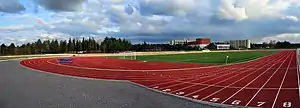 Koç Arena  The Pool Complex The school has many facilities for sports. Some of the school sport teams are girls-boys basketball, girls volleyball, badminton, table tennis, athleticism, football, folk dance, skiing, dance, and rhythmic gymnastics. Team members are determined after eliminations at the beginning of the academic year. School teams regularly participate in national tournaments. Each year there are basketball and football tournaments between classes in which each class forms its teams. There are about two matches each week in which boys and girls from different classes compete. The final matches are done at SpringFest. The winner class team is awarded with a cup and each team member with a medal. PublicationsThe school has a growing number and an increasing quality of publications, among them are literary magazines like Boyut, Fanzin and Mindscapes, a two-week newspaper T.A.W.A, and Philosophy. All publications are open to submissions from the whole student body. Boyut and Fanzin are published by the member students in each journal's clubs with the assistance of the Turkish department. Mindscapes is published with the assistance of the English language department and it is also open to all contributions after an evaluation process carried by the student and teacher editors. TAWA[20] was initially the publication/newsletter of the Student Council and later gained an independent position as the school newspaper in 2003. It is published by a team of student journalists independent from clubs and student organisations. MUN (Model United Nations)The MUN Club admits its members on an application basis. Students have to write a convincing statement of purpose and score above average at the exam testing general knowledge of the member applicants. There are approximately 60 members of the club. Each year the MUN Club attends at least five MUN conferences in Turkey and around the world. Some of the conferences participated by the Koc School students in the previous years took place in various parts of the world including the Hague, Cairo, Beijing, Brussels and Paris. MUN Club has been among the most successful clubs in the school with many awards, such as Best Governor, Award of Distinction and Best Delegate in the conferences participated such as Harvard Model Congress Europe by students Bülent Kozlu (1997), Josef Amado (1997), Hale Altan (1997), Özlem Cebeci (2009), Berke Tınaz (2010), Alp Yavuz (2011), Ecesu Bayır (2011), Ege Mihmanlı (2011), Sinan Adlım (2012).[21][22] The club also organises a Model United Nations Development Programme conference each year at its campus since 2001. "MUNDP".is the first Model United Nations Development Programme conference in the world, whose establishment in 2001 was celebrated by the former UN General Secretary Kofi Annan. Each year MUN Delegates from many schools in Turkey and overseas participate in the conference. Each year more than 650 participants attend to the conference as delegates, chairs, advisors, admins and executive committee members. 2017's conference was the 17th session of MUNDP and the participant number exceeded 800 for the first time.[23][24] Student CouncilKoç School Student Council is composed of students elected by the student body at the regular elections each year in June. It is composed of 18 students with 6 members from the 12.and 11.grade and 2 representatives from each class at school. The Student Council consists of a school president, vice president, social activities coordinator, finance coordinator, sports coordinator, 1 independent student representative elected from the 12. grade students and a total of 12 representatives elected from grades 9–11 and preparatory year students. The Council meets regularly each week with a faculty adviser. All major and important decisions of the council are to be approved by the faculty adviser even if the meetings are done without the presence of the adviser. Even though it's criticized of its lack of ability to effect school politics (an example would be the abolishing of Courtyard and building a pyramid instead, which was disliked by many of the students during the time) concerning discipline code, student freedoms etc., it is an active student organization with especially its election campaigns being one of the major events each year. Special eventsFestivals, fairs and performances
Student contests
TraditionsAlthough Koç School is a relatively young school, it is promising with its traditions adhered by its student body and alumni. Following are notable traditions and traditional activities in the school.
Notable alumni
Koç School Alumni Association offers several activities for the alumni including homecomings, Summer Picnic[30] at campus, Winter Reunion in Istanbul, and Reunions in Boston, New York and London. Elementary schoolThe elementary school was founded in 1998. It was established in order to adapt to the change in the Turkish education system. Education is, again, bilingual in English and Turkish across all grades. Students are taught English language from the earliest years. In Grade 4 and 5 students take extra Science and Maths classes which are taught in English. Starting from the sixth year Science and Math classes are taught in English. Graduates of the elementary school have the right to continue their education at the high school after taking an exam to skip the preparation year. If they score over 55% in this exam, they are automatically enrolled in 9th grade of the high school. If they score below 55%, they have to study 1 year of extensive English preparation. See alsoReferences and notes
External linksWikimedia Commons has media related to Koç Lisesi. |